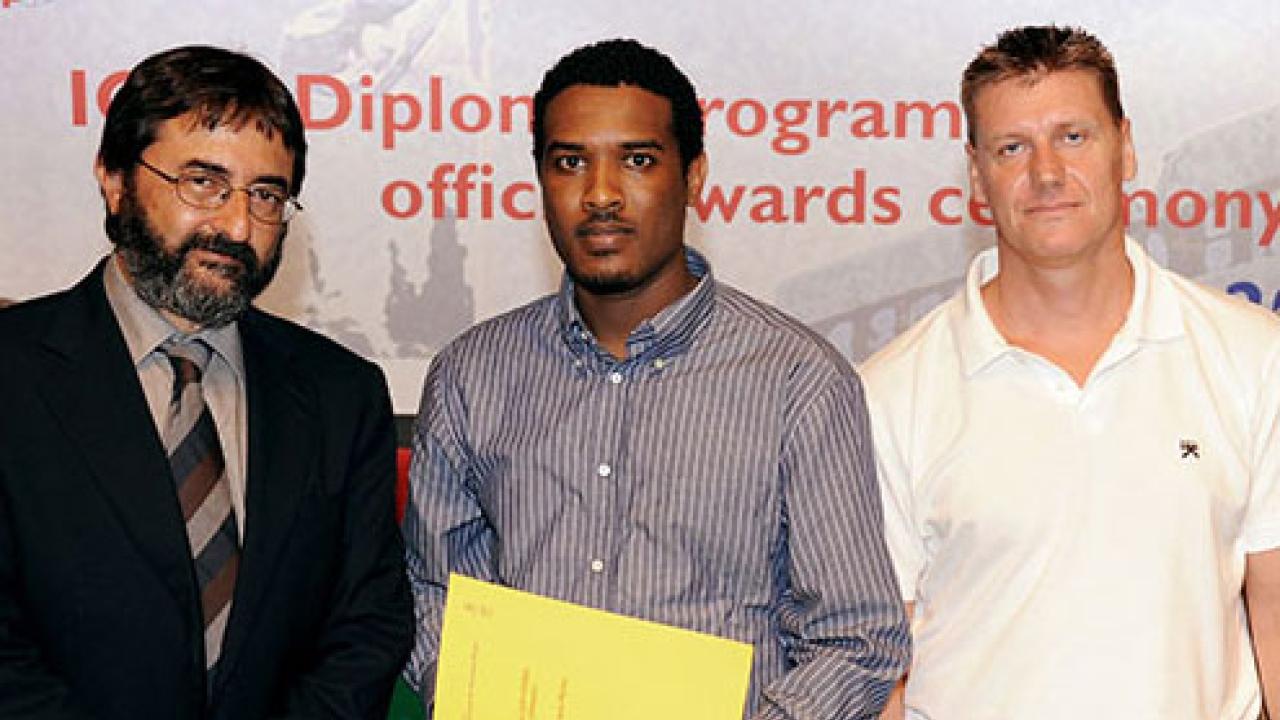
Hussen Seid Endris has been having a good couple of years, with the successful completion of his PhD in climatology on the horizon and a new job secured. But he also has a publication record quite admirable for a scientist who has yet to defend his doctoral thesis. Endris is the first author on two recent papers published in top climate research journals, and shows no sign of slowing down.
All of this success is extremely gratifying and exciting for his past advisors at ICTP: Endris was a student in ICTP's Postgraduate Diploma Programme from 2009 to 2010 in the Earth Systems Physics (ESP) section. The Diploma Programme aims to prepare students from throughout the developing world for PhD studies, with an intensive year of courses and independent research in either condensed matter physics, high energy physics, earth systems physics, or mathematics.
In contrast to the condensed matter or high energy physics fields, ESP has only had a specialized Diploma programme since 2006, so Endris is among one of the first few classes of students to finish their PhDs and start to build their careers. He will defend his thesis and receive his PhD from the University of Cape Town in South Africa in December, but he's already moved on to his next position, keeping the momentum of his career going. ICTP's larger mission is to promote and support advanced scientific research communities in developing countries, so it's always encouraging when successful Diploma alumni return to their home countries to continue their scientific success.
While Endris has yet to make his professional return to his native Ethiopia, he has just started a new job next door in Kenya at IGAD Climate Prediction and Application Centre (ICPAC). He works in climate modeling, investigating the recent and future climate variability and change over Eastern Africa using an ensemble of climate models. Different global climate models and regional climate models include different factors and assumptions in their calculations, which result in different levels of accuracy in specific regions and seasons. Endris's recent work has focused on finding which regional models best simulate historical climate patterns over East Africa. A wide variety of variables differentiate the models, including which global models and Earth-system models they are coupled to. As a result, different models' predictions for different regions and sub-regions can vary quite a bit, in both year-long patterns and variability across several years. Measuring the strengths and weaknesses of 10 different regional models in simulating the characteristics of rainfall patterns over East Africa was the focus of Endris's 2013 paper, published in the American Meteorological Society’s Journal of Climate (DOI: http://dx.doi.org/10.1175/JCLI-D-12-00708.1).
His latest, published in Climate Dynamics in 2015 (DOI: 10.1007/s00382-015-2734-7), looked specifically at teleconnections, one of the variables that can make it hard to accurately predict regional weather. Teleconnections are links between places very far apart from one another, where conditions in one place are related to conditions at the other. A specific region can be affected by the sea surface temperature or atmospheric pressure in a distant place, somewhere not obviously connected to local climate patterns. As his previous work helped demonstrate, "Every model has it's own strengths and weaknesses, that's why I'm using an ensemble of regional and global models to look at teleconnection patterns," Endris says. Regional models sometimes don't have the ability to include teleconnections when they focus on one area. Integrating teleconnections, however, gets a climate model closer to consistent accuracy in predictions. Endris's most recent paper pits various regional models against each other to find the one with the best ability to simulate teleconnections, and thus paint a fuller--and generally more accurate--picture of climate patterns in East Africa.
Climate change is hitting developing countries much harder than developed ones, according to the Intergovernmental Panel on Climate Change. While recent economic growth in East Africa has been encouraging, climate change remains a huge challenge, especially to the large agricultural sector in the region. The local unstable climate patterns accompanying global climate change make it even more important to understand the nuanced factors behind rainfall patterns, as drought has already become a recurring issue in the region.
As a recent UNESCO report on science worldwide pointed out, there can be no sustainable development without investment in both applied and basic science. Endris's publications are part of a rise in the number of scientific publications coming from scientists in East Africa, especially Ethiopia and Kenya. While the life sciences dominate publishing production, the physics and mathematics communities are slowly growing and publishing more as well, as more money is put toward higher education and support for research.
Endris brings his energy and initiative to this community, qualities that stood out to his Diploma Programme advisors. "He is one of the few Diploma students to stay in Africa and do good research," says Fred Kucharski, a physicist in ICTP's ESP section. Kucharski remembers Endris's dedication to learning as much as possible as a Diploma student, filling any gaps in his background and taking the initiative to enhance his independent projects. That initiative and hard work got Endris to his current flourishing career and will likely propel him much further.
--Kelsey Calhoun
















